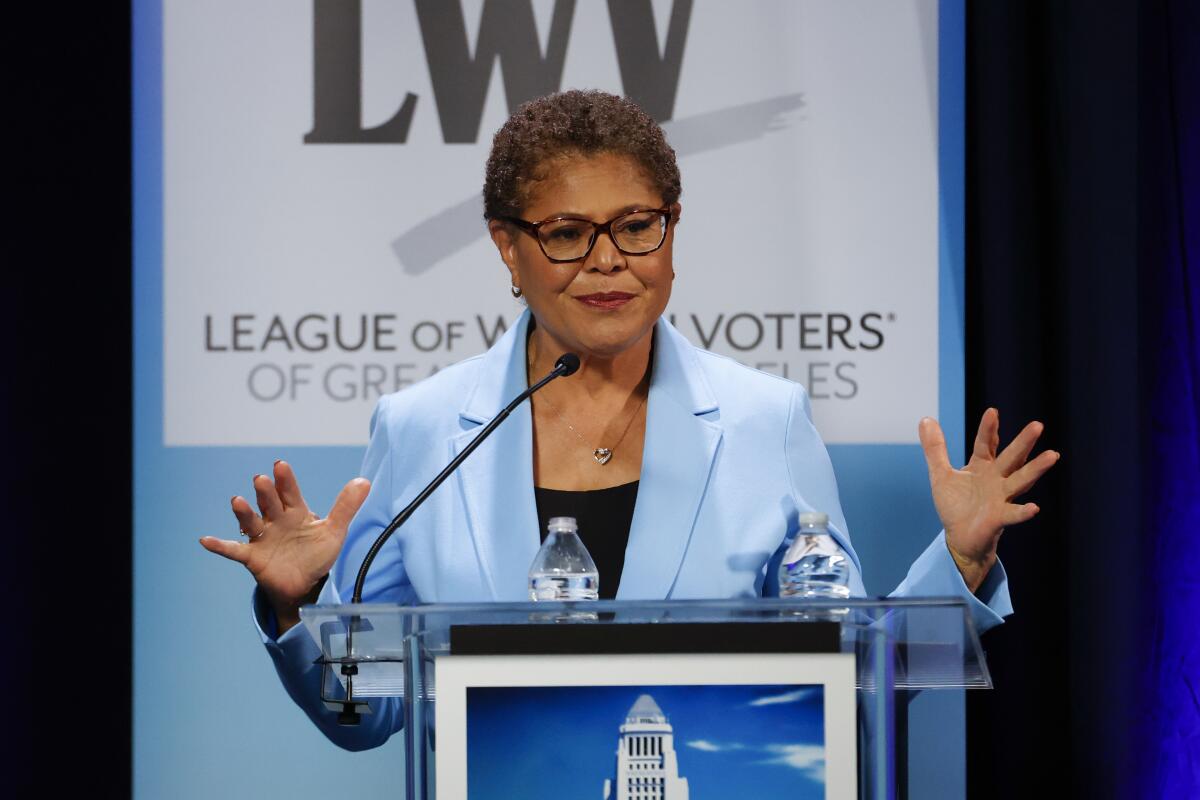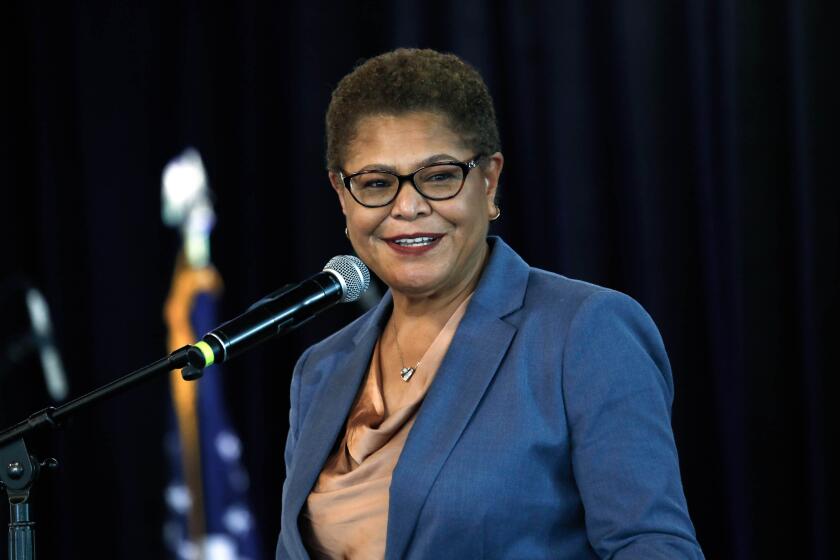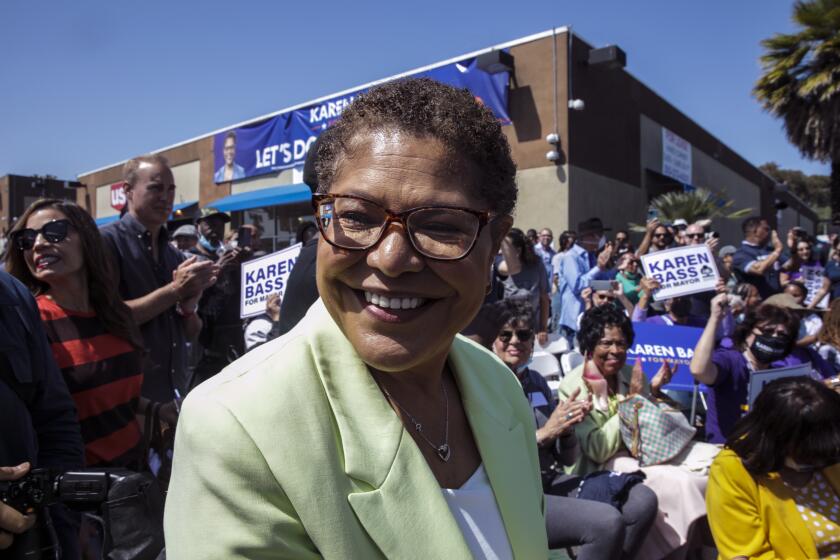Bass campaign calls police union ad ‘defamatory,’ demands that TV stations stop airing it

A lawyer for Rep. Karen Bass sent a cease-and-desist letter to five Los Angeles television stations on Tuesday, demanding that they stop airing a campaign attack ad that he called untrue and “defamatory.”
Bass, running in the June 7 primary election to replace Mayor Eric Garcetti, said through her lawyer that the 30-second campaign commercial, produced by the union representing rank-and-file Los Angeles police officers, contains “false, misleading and defamatory” information about her and her voting record in Washington, D.C.
Stephen J. Kaufman, a lawyer for the campaign, said in his letter that the commercial falsely claims that Bass, after receiving free tuition from the university, “repeatedly voted to give USC millions in taxpayer funds.”
“Karen Bass never voted to appropriate taxpayer funds to USC, and none of the bills cited in the ad refer to USC,” he wrote. Kaufman said the campaign would pursue “legal remedies” against stations that continue to air the commercial.
Rep. Karen Bass received a full-tuition scholarship for graduate study at USC’s School of Social Work, worth $95,000.
The filing comes on the same day that a political action committee sponsored by the Los Angeles Police Protective League began airing nearly $2 million worth of ads that seek to tie Bass to a federal corruption case targeting Councilman Mark Ridley-Thomas, an ally who is also a defendant in a USC corruption case.
The union’s ads focus on Bass’ decision a decade ago to accept $95,000 in free tuition for an online master’s program at USC’s School of Social Work while serving in Congress and representing the district that includes USC. The House Committee on Ethics cleared Bass’ request to accept the tuition award.
The Times reported last year that the scholarship was offered to Bass by USC Dean Marilyn Flynn, who was later charged in a federal bribery case involving L.A. County contracts. Bass did not disclose the full value of her scholarship until 2019, and recently attributed the reporting errors to her former chief of staff, noting they were discovered by her lawyer.
The police union, which has endorsed real estate developer Rick Caruso, alleged in its attack ad that Bass voted on multiple bills that benefited the university, both while attending the school and after.
Tom Saggau, spokesman for the police union’s PAC, said the commercial is neither false nor defamatory. Bass voted repeatedly for federal bills that were the subject of lobbying efforts by USC, he said, which resulted in more funding for the university. Saggau also pointed to a 2019 news release from USC, which discussed a lobbying trip in which its trustees — including Caruso — laid out their funding priorities with Bass and other lawmakers.
“It is now clear why Congresswoman Bass failed to legally disclose the $95,000 in free tuition she took from USC for 7 years in a row on her annual gift disclosure forms,” he said in an email. “She wanted to hide it from the public and now Bass doesn’t want the public to know the facts behind this shady deal prior to this election.”
Anna Bahr, a spokeswoman for the Bass campaign, said that over the last decade, Bass voted for legislation that funded entire federal agencies. Those agencies went on to make their own decisions on funding for various educational institutions, she said.
Bass “proudly voted for federal budgets that brought millions of dollars to L.A., including UCLA, Cal State L.A., Cal State Dominguez Hills, Cal State Northridge, L.A. Trade Tech and USC,” Bahr said in an email. “It is important, however, to remember that these bills funded the entire federal government.”
The police union’s ads also attempt to link Bass to Ridley-Thomas, a target in the federal USC corruption case. Prosecutors have accused Ridley-Thomas and Flynn of conspiring to steer county money to the university in return for admission of Sebastian Ridley-Thomas, the councilman’s son, into the graduate school with a full-tuition scholarship and paid professorship. Mark Ridley-Thomas, who has proclaimed his innocence, was on the L.A. County Board of Supervisors at the time.
Flynn and Ridley-Thomas have pleaded not guilty. Bass has not been accused of any wrongdoing. Nevertheless, the police union has set up a website to highlight the USC tuition issue, which features images of Bass, Ridley-Thomas and Flynn.
The union first announced its decision to highlight the USC issue on Monday. Union Vice President Jerretta Sandoz said in a statement that it was “appalling” that Bass had received the free tuition when other Angelenos were making “sacrifices to earn their education.”
Ballots are already arriving in Los Angeles homes ahead of the June 7 primary. Karen Bass and Rick Caruso have led the mayoral pack, with nearly 40% of likely voters undecided.
Politically speaking, Bass’ decision to issue the cease-and-desist letter is something of a gamble, because it could end up drawing more attention to the ads. On Wednesday, a group of religious leaders is scheduled to hold a news conference in South Los Angeles to denounce the ad and demand an apology from the union.
None of the stations that were sent the letter responded immediately to a request for comment. But one expert said the bar for proving defamatory speech is high, leaving open the possibility that the ads remain on the air.
Jessica Levinson, an election law professor at Loyola Law School, said the ads could be seen as potentially misleading, since they suggest a quid pro quo between Bass’ scholarship and her votes on broad spending bills. But Levinson said she thinks it is unlikely the ad rises to the level of defamatory speech.
“I don’t think you can prove an intentional false statement of fact, which is the standard for public officials,” she said, speaking about defamation standards.
Times staff writers Dakota Smith and Matt Hamilton contributed to this report.
More to Read
Sign up for Essential California
The most important California stories and recommendations in your inbox every morning.
You may occasionally receive promotional content from the Los Angeles Times.














